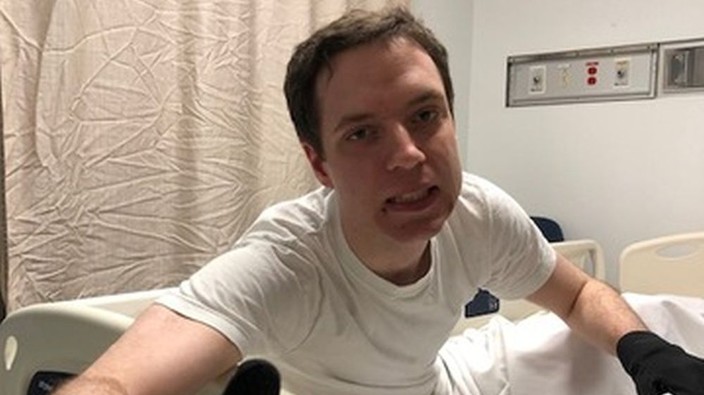ottawa man has been hospitalized, restrained more than 19 months
he has been in a secure acute psychiatric ward at the ottawa hospital since february 2020, when his parents called 911 after a violent outburst.

jean-marc lang, 27, has been in a secure ward at the ottawa hospital since february 2020 because of his extreme behavioural issues, including aggression and self-injury. (family photo)
lang family
by: blair crawfordnearly 20 months after jean-marc lang entered the ottawa hospital, the 27-year-old orléans man with autism, developmental delays and severe behavioural issues is still waiting for meaningful help, his parents say.“just yesterday he was saying ‘car!’ and ‘home!’” relates his mother, hélène boisvert. “he means, ‘let’s go. i’m tired of being here.’ and i had to tell him, ‘oh my god. we can’t leave here, jean-marc.’ and he started crying.”jean-marc has been in a secure acute psychiatric ward at the ottawa hospital since february 2020, when his parents, boisvert and michael lang, had to call 911 after a particularly violent outburst during a trip to ikea. when they first contacted this newspaper in november 2020 — after jean-marc had already spent nine months in hospital — there was an opening for him at a kingston treatment facility for adults with developmental issues. but they were told there was no money available from the ministry of children, community and social services to pay the estimated $2,000 a day cost for treatment.now that opening is gone and, as he closes in on two years in his hospital room, jean-marc’s behaviours have become so bad that the hospital says it’s unlikely they would be able to discharge him anyway. he spends his days sedated, often in physical restraints.“we are convinced that, had the government come up with the funds in the first place, his overall quality of life would have been much better,” boisvert said.jean-marc’s life is ruled by harrowing rituals and behaviours. it includes self injury, where he pulls out his own fingernails and toenails. he incessantly picks at wounds and scabs.“he’ll pick at his skin until it bleeds,” helene said. “and then he’ll match it on the other side of his body. then he’ll repeat it so the sore gets bigger and bigger, deeper and deeper.”he’s obsessed with any flaws or imperfections and will try to destroy anything that’s blemished. he has broken three ipods, sometimes biting them so hard that he has chipped his teeth. once, he ripped at a hospital staff member’s id card because he saw it was damaged. that has led to a new ritual where he lunges to grab anyone’s id badge.“when these behaviours happen, if they’re not addressed, they just get worse,” boisvert said. “the hospital told us that, even if the government came up with funding, they’re not sure if they would release him. it might be another six months … they’re not addressing his behaviours. they’re just sedating him. he’s just staying there and getting worse and worse.”the family estimates it’s costing $2,000 a day for jean-marc to stay at the hospital. the daily cost for an acute bed at toh is about $1,000. in addition, the hospital pays for an around the clock security guard. a personal-care assistant is paid to stay with him overnight, and there are two behavioural specialists from an outside agency that work with jean-marc during the day. helene or michael, sometimes both, are with him from 3:30 p.m. to 7:30 p.m.“we go every day. we bring jean-marc everything he needs,” helene said. “we do the work as well as we can with the staff to help them care for jean-marc when we’re not there. we spend the best time that we can with him. we try to comfort him. we try to keep him busy. we do that day in and day out.”meanwhile, boisvert and lang say they’ve felt pressured to let the hospital increase jean-marc’s “cocktail” of medications.the hospital has been unable to provide the intensive applied behavioural analysis (aba) that boisvert says is the only thing that has helped jean-marc’s behaviour. he is a regular source of hospital “code white” security calls and the hospital has warned that police might be needed if he becomes too violent.boisvert says jean-marc needs treatment in a neuro-behavioural unit, where staff are trained to wean him off his harmful behaviours. the limitations of the covid-19 pandemic and the fact jean-marc only understands french make that especially difficult.“what we need is something that doesn’t exist here yet,” boisvert said. “that’s the only way we’re going to address these behaviours and successfully reintegrate him into the community.“we hope that something good will come out of it at some point. because it’s not only jean-marc. there are others like him that need a place that’s appropriate and effective and specialized to their needs that can help them live a more appropriate life in their community.”in a statement, the ottawa hospital said it couldn’t comment on jean-marc’s case for privacy reasons.“one of the hospital’s top priorities is ensuring that patients have access to the most appropriate care for their specific needs,” the statement read. “the covid-19 pandemic has created several challenges in this area, making it more difficult to transfer patients to care in the community that would be more suitable for them. we will continue working with health partners, including the ministry of long-term care, to ensure that all patients receive access to the care they need.”the ontario government says it is spending $2.9 billion on developmental services this year, an increase of $366 million since 2018-19. of that, $1.9 billion is to support approximately 19,000 adults with developmental disabilities at some 240 non-profit, government-funded agencies.in an email, the ministry of children, community and social services says its urgent response program helps 1,500 individuals a year access services and supports and is spending $13 million more over the next three years to help people with developmental disabilities access housing in the community.meanwhile, the wait list continues to grow. at the end of the 2020-21 fiscal year, 23,900 adults with developmental disabilities had requested help with supportive housing. that was 1,500 more than there were last november, when this newspaper first told jean-marc’s story.
 4 minute read
4 minute read





